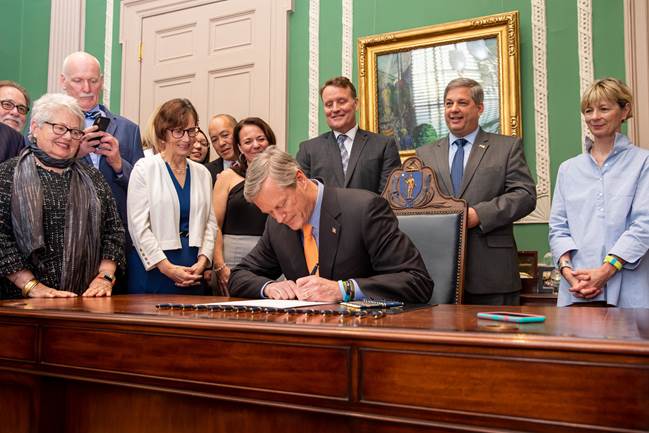The following is a press release from the Massachusetts Governor’s office submitted to SOURCE media.
***
BOSTON – Massachusetts Governor Charlie Baker, Lt. Governor Karyn Polito, Health and Human Services Secretary Marylou Sudders and Department of Developmental Services (DDS) Commissioner Jane Ryder today joined advocates, legislators and family members of individuals with developmental disabilities for a ceremonial signing of An Act To Protect Persons with Intellectual or Developmental Disabilities from Abuse, also known as “Nicky’s Law.”
[broadstreet zone=”59982″]
Administration officials were joined by Nancy Alterio, Director of the Disabled Persons Protection Commission, Leo Sarkissian, Executive Director of the Arc of Massachusetts, family members of the law’s namesake Nicky Chan, and other advocates and legislators to celebrate the enactment of the law, which establishes a new abuse registry of caregivers in Massachusetts.
The registry will be administered by the Disabled Persons Protection Commission (DPPC) – the agency tasked with protecting adults with disabilities from the abusive acts or omissions of their caregivers – who will maintain the registry’s list of any providers or caregivers with histories of substantiated abuse. Effective January 31, 2021, any individual listed on the registry cannot be hired or work for DDS or any of its licensed or funded providers throughout the state.
“Protecting individuals with intellectual and developmental disabilities is vitally important, and I want to thank the family members, advocates and our legislative colleagues for their work to pass this bill,” said Governor Charlie Baker. “The new registry established in Nicky’s Law will provide an additional safeguard against abuse and further improve the safety and quality of services provided to some of the Commonwealth’s most vulnerable residents.”
[broadstreet zone=”59983″]
[broadstreet zone=”51611″]
“By enacting Nicky’s Law, the Commonwealth is making clear that we continue to view the safety of those with developmental disabilities as a top priority,” said Lt. Governor Karyn Polito. “We are pleased to support the creation of the registry outlined in this law, which creates a new mechanism for the Department of Developmental Services and its providers to conduct comprehensive background checks on employment candidates.”
Currently, candidates who apply to DDS or one of its licensed providers must undergo a Criminal Offender Record Information (CORI) and National Background Check screening before they can be hired. The creation of this Registry will now provide an additional resource against which DDS and its providers must conduct comprehensive background checks on candidates interested in working with those served by the Department.
“The safety and wellbeing of those we serve is paramount across health and human services,” said Health and Human Services Secretary Marylou Sudders. “We will continue to work with DPPC and the many advocates like the Arc of Massachusetts, who were instrumental in passing this bill, to keep identifying ways we can protect and safeguard individuals from harm or neglect.”
[broadstreet zone=”70107″]
DDS provides support to over 40,000 individuals with intellectual and developmental disabilities in a variety of residential settings (ranging from state operated facilities and group homes), community-based day programs, and employment settings, among others.
“By expanding our ability to thoroughly vet candidates – and tracking trends and instances of abusive behaviors – this additional tool helps us better protect the individuals we serve and helps end repeated cases of abuse by caregivers,” said Department of Developmental Services Commissioner Jane Ryder.
“People with disabilities and their families deserve peace of mind when it comes to getting the care they need,” said Senate President Karen E. Spilka (D-Ashland). “With this law, we reassert our values as a Commonwealth to protecting the most vulnerable among us from abuse and to holding perpetrators accountable. I would like to thank Senators Michael Moore and Sonia Chang-Diaz as well as my legislative colleagues, families and advocates for bringing this registry to fruition.”

“This registry provides protections for the most vulnerable among us, and I’m proud of the House’s ongoing work to ensure the safety and wellbeing of people with intellectual or developmental disabilities,” said House Speaker DeLeo, (D – Winthrop). “Thank you to Chairs Michlewitz, Campbell, Khan and Cutler for their thoughtful contributions and to the members of the House who worked on this issue.”
“I am incredibly happy and proud that today Nicky’s Law was officially signed into effect by the Governor. Of course this would not be possible without the incredible work of individuals and organizations that pushed for this bill and worked behind the scenes to get us where we are today. I think this is a real testament to the power that advocacy can have in the legislative process, and it’s because of these advocates that we were able to get this common sense legislation pushed through and provide the Commonwealth’s most vulnerable population the protections they deserve,” said Senator Michael Moore (D – Worcester).
[broadstreet zone=”59948″]
“The love that these families have for their children is so strong and unrelenting that they managed to manifest real change so that no one would have to endure what their children did,” said Senator Patrick O’Connor (R-Weymouth), a lead sponsor of the bill. “Today is a great day in our fight to protect the most vulnerable among us and it is all thanks to the families that had the courage to tell their story.”
“The testimony of families and caretakers of victims makes clear that this legislation is absolutely necessary to protect our fellow human beings who most often cannot communicate that they are being abused,” said Representative Linda Dean Campbell (D-Methuen). “To protect the most vulnerable among us is clearly one of the most important responsibilities we have as lawmakers. This law also provides a way for us to do so while protecting those saints among us who care for those most in need.”
“The Disabled Persons Protection Commission is very excited to be part of a measure that provides another tool to combat pervasive abuse against persons with intellectual and developmental disabilities,” said Nancy Alterio, Executive Director of the Disabled Persons Protection Commission. “The Commission is honored that advocates and the Legislature have entrusted this effort to the DPPC – with collaboration, all things are possible.”

“Through this registry, our governor and our lawmakers are sending a strong message; that there is no room for disrespect and that the Commonwealth will safeguard the human rights of adults with disabilities,” said Leo Sarkissian, Executive Director of the Arc of Massachusetts.
“I am incredibly proud of what’s been accomplished by the passage of Nicky’s law both as chair of AFAM and, above all, as a parent of an adult son with autism in a residential placement,” said Michael J. Borr, Chairman of Advocates for Autism of Massachusetts. “This effort is a case in point of what is possible when we advocate as a community and partner with our elected officials resulting in the passage of this important legislation. I want to especially thank Senate President Spilka, Speaker DeLeo and Governor Baker for their support. Nicky’s Law will help to protect individuals, our most vulnerable, who cannot protect themselves. We are their voices.”
[broadstreet zone=”58610″]
DPPC will maintain the registry and oversee all functions including notification, decision appeals and requests to remove a name from the Registry.
The law takes effect on January 31, 2021, and will only include the names of individuals with substantiated cases of abuse after that date.

